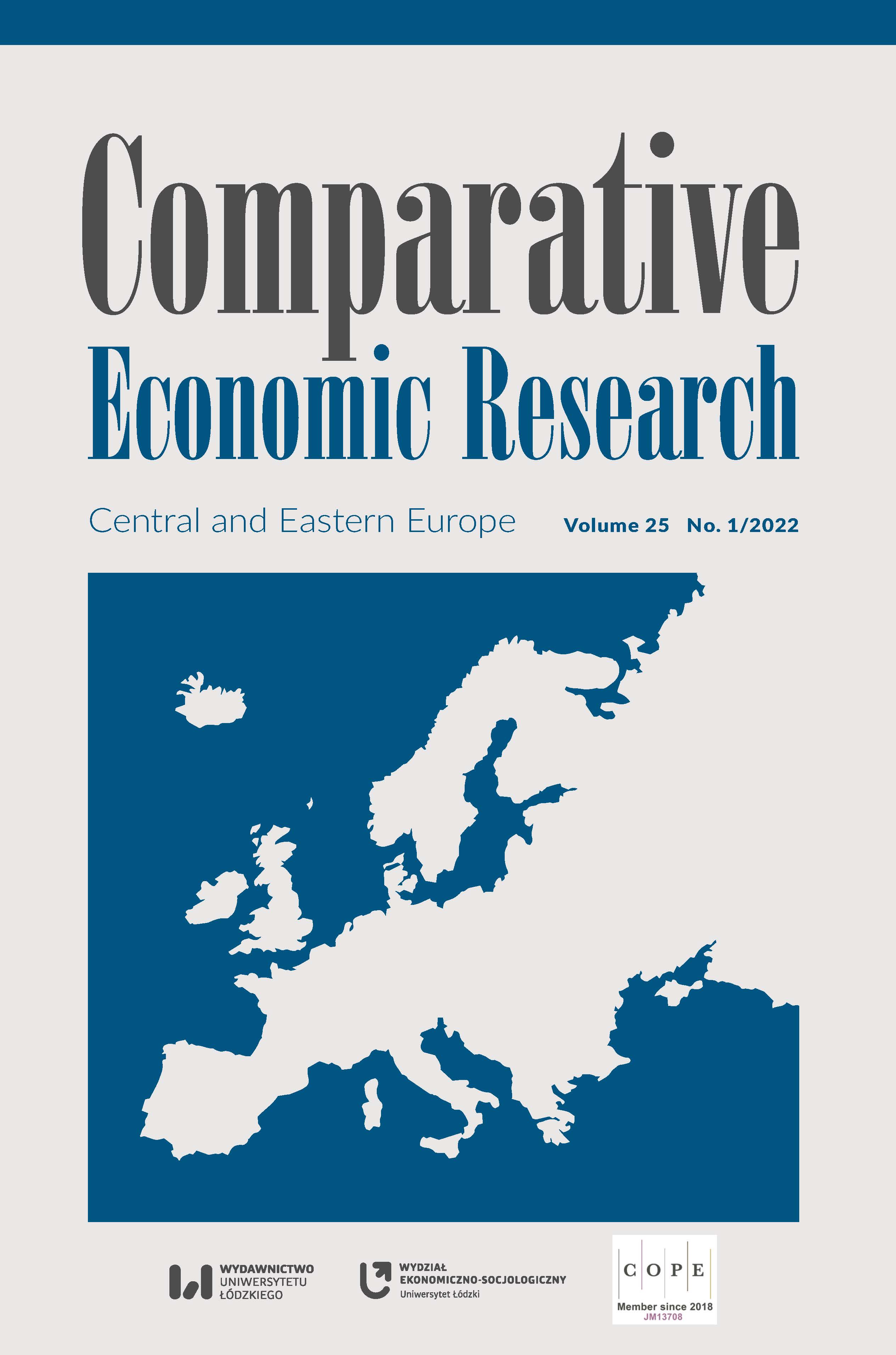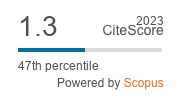The Inefficiency of the Adjustment Mechanism in the Contemporary Global Economy. The Case of the United States and China
DOI:
https://doi.org/10.18778/1508-2008.25.03Keywords:
international capital flows, global imbalance, current account, adjustment mechanism, United States, ChinaAbstract
In the current international monetary system, the adjustment mechanism does not work properly to eliminate the excessive surpluses/deficits on the current accounts of the major countries that participate in international trade. Consequently, the adjustment changes do not take place in an evolutionary way, through market changes or decisions taken by the national authorities. They are the result of crises that reflect the unfavourable macroeconomic situation in different countries. The article explains the functioning of the adjustment mechanism in the contemporary international monetary system and the circumstances in which significant imbalances emerge at the global (US–China) level. Increasing external imbalances are an immanent systemic feature of the contemporary international monetary system. The lack of an adjustment mechanism in this system leads to the potentially cyclical emergence of such imbalances and their correction by crises. Thus, the current post‑crisis period may only be a stage before the next period of growing imbalances. The remedy for this threat lies in correcting the existing principles of the system.
Downloads
References
Adams, Ch., Park, D. (2009), Causes and Consequences of Global Imbalances: Perspective from Developing Asia, “Asian Development Bank Economics Working Paper Series”, 157, https://doi.org/10.2139/ssrn.1611424
Google Scholar
DOI: https://doi.org/10.2139/ssrn.1611424
Alberola, E., Estrada, A., Viani, F. (2020), Global imbalances from a stock perspective: The asymmetry between creditors and debtors, “Journal of International Money and Finance”, 107, https://doi.org/10.1016/j.jimonfin.2020.102206
Google Scholar
DOI: https://doi.org/10.1016/j.jimonfin.2020.102206
Barrel, R., Holland, D., Hurst, I. (2007), Sustainable Adjustment of Global Imbalances, “Studies & Analyses CASE”, 343, https://doi.org/10.2139/ssrn.1436908
Google Scholar
DOI: https://doi.org/10.2139/ssrn.1436908
Blanchard, O. (2007), Current Account Deficits in Rich Countries, “Working Paper”, 12925, National Bureau of Economic Research, Cambridge, https://doi.org/10.3386/w12925
Google Scholar
Bordo, M.D. (2005), Historical perspective on global imbalances, “Working Paper”, 11383, National Bureau of Economic Research, Cambridge, https://doi.org/10.3386/w11383
Google Scholar
Borio, C., Disyatat, P. (2010), Global Imbalances and the Financial Crisis: Reassessing the Role of International Finance, “Asian Economic Policy Review”, 5 (2), pp. 198–216, https://doi.org/10.1111/j.1748-3131.2010.01163.x
Google Scholar
DOI: https://doi.org/10.1111/j.1748-3131.2010.01163.x
Ca” Zorzi, M., Chudik, A., Dieppe, A. (2012), Thousands of models, one story: Current account imbalances in the global economy, “Journal of International Money and Finance”, 31 (6), pp. 1319–1338, https://doi.org/10.1016/j.jimonfin.2012.02.003
Google Scholar
DOI: https://doi.org/10.1016/j.jimonfin.2012.02.003
Caballero, R.J., Farhi, E., Gourinchas, P.‑O. (2015), Global Imbalances and Currency Wars at the ZLB, “NBER Working Paper”, 21670, National Bureau of Economic Research, Cambridge, https://doi.org/10.3386/w21670
Google Scholar
DOI: https://doi.org/10.3386/w21670
Chinn, M.D., Ito, H. (2019), A Requiem for “Blame It on Beijing”: Interpreting Rotating Global Current Account Surpluses, “NBER Working Paper”, 26226, National Bureau of Economic Research, Cambridge, https://doi.org/10.3386/w26226
Google Scholar
DOI: https://doi.org/10.3386/w26226
Ciocyte, O., Rojas‑Romagosa, H. (2015), Literature survey on the theoretical explanations and empirical determinants of current account balances, CPB Netherlands Bureau for Economic Policy Analysis, The Hague, https://www.cpb.nl/sites/default/files/publicaties/download/cpb‑background‑document‑literature‑survey‑theoretical‑explanations.pdf (accessed: 21.03.2020).
Google Scholar
Clarida, R.H., Goretti, M., Taylor, M.P. (2006), Are There Thresholds of Current Account Adjustment in the G7?, Working Paper 12193, http://www.nber.org/papers/w12193 (accessed: 21.03.2020).
Google Scholar
DOI: https://doi.org/10.3386/w12193
Collignon, S. (2006), Adjusting the U.S. Current Account Deficit: What Role for the Dollar, Euro and Yen?, “Journal of Asia‑Pacific Business”, 7 (2), pp. 5–26, https://doi.org/10.1300/J098v07n02_02
Google Scholar
DOI: https://doi.org/10.1300/J098v07n02_02
Coughlin, C.C., Pakko, M.R., Poole, W. (2006), How dangerous is the U.S. current account deficit?, “The Regional Economist”, April, pp. 4–9, https://files.stlouisfed.org/files/htdocs/publications/regional/06/04/account_deficit.pdf (accessed: 20.12.2020).
Google Scholar
Debelle, G., Galati, G. (2005), Current account adjustment and capital flows, “BIS Working Papers”, 169, https://doi.org/10.2139/ssrn.781164
Google Scholar
DOI: https://doi.org/10.2139/ssrn.781164
De Cecco, M. (2012), Global Imbalances: Past, Present, and Future, “Contributions to Political Economy”, 31 (1), pp. 29–50, https://doi.org/10.1093/cpe/bzs001
Google Scholar
DOI: https://doi.org/10.1093/cpe/bzs001
Devereux, M.B., Genberg, H. (2007), Currency appreciation and current account adjustment, “Journal of International Money and Finance”, 26 (4), pp. 570–586, https://doi.org/10.1016/j.jimonfin.2007.03.008
Google Scholar
DOI: https://doi.org/10.1016/j.jimonfin.2007.03.008
Dooley, M.P., Folkerts‑Landau, D., Garber, P. (2003), An Essay on the Revived Bretton Woods System, “NBER Working Paper”, 9971, National Bureau of Economic Research, Cambridge, https://doi.org/10.3386/w9971
Google Scholar
DOI: https://doi.org/10.3386/w9971
Duarte, P., Schnabl, G. (2015), Macroeconomic Policy Making, Exchange Rate Adjustment and Current Account Imbalances in Emerging Markets, “Review of Development Economics”, 19 (3), pp. 531–544, https://doi.org/10.1111/rode.12168
Google Scholar
DOI: https://doi.org/10.1111/rode.12168
Edwards, S. (2005), Is The U.S. Current Account Deficit Sustainable? If Not, How Costly Is Adjustment Likely To Be?, “Brookings Papers on Economic Activity”, 1, pp. 211–288, https://doi.org/10.1353/eca.2005.0018
Google Scholar
DOI: https://doi.org/10.1353/eca.2005.0018
Eichengreen, B. (2010), Global Imbalances and the Lessons of Bretton Woods, Cairoli Lectures, The MIT Press, Cambridge.
Google Scholar
Farhi, E., Gourinchas, P.‑O., Rey, H. (2011), Reforming the International Monetary System, Centre for Economic Policy Research, London.
Google Scholar
Faruqee, H., Laxton, D., Muir, D., Pesenti, P.A. (2007), Smooth Landing or Crash? Model‑Based Scenarios of Global Current Account Rebalancing, [in:] R.H. Clarida (ed.), G7 Current Account Imbalances: Sustainability and Adjustment, University of Chicago Press, Chicago, pp. 377–455, https://www.nber.org/system/files/chapters/c0123/c0123.pdf (accessed: 20.04.2021)
Google Scholar
DOI: https://doi.org/10.7208/chicago/9780226107288.003.0011
Federal Reserve Economic Data, Economic Research Division, Federal Reserve Bank of St. Louis, China/U.S. Foreign Exchange Rate (DEXCHUS), https://fred.stlouisfed.org/series/DEXCHUS (accessed: 12.03.2021).
Google Scholar
Feldstein, M.S. (2008), Resolving the Global Imbalance: The Dollar and the U.S. Saving Rate, “NBER Working Paper” No. 13952, National Bureau of Economic Research, Cambridge, https://doi.org/10.3386/w13952
Google Scholar
DOI: https://doi.org/10.3386/w13952
Ferguson, R.W., Jr. (2005), US current account deficit – causes and consequences, “BIS Review”, 27, https://www.bis.org/review/r050422b.pdf (accessed: 21.03.2020).
Google Scholar
Fisher, R.A. (2019), Global Imbalances: A Job for the G20?, “Discussion Paper”, 18, German Development Institute, Bonn, https://doi.org/10.23661/dp18.2019
Google Scholar
IMF, Group of Twenty (2019), Global Imbalances, IMF Staff Note, G–20 Finance Ministers and Central Bank Governors” Meetings, June 8–9, Fukuoka, https://www.imf.org/external/np/g20/pdf/2019/060519b.pdf (accessed: 6.10.2021).
Google Scholar
Janicka, M. (2018), Capital flows and External Imbalances in the Eurozone, [in:] S.I. Bukowski (ed.), Monetary Unions. Background, Advantages and Disadvantages, Nova Science Publishers New York, Inc., New York.
Google Scholar
Kolerus, Ch. (2021), What Shapes Current Account Adjustment During Recessions?, “IMF Working Paper”, 198, https://www.imf.org/‑/media/Files/Publications/WP/2021/English/wpiea2021198‑print‑pdf.ashx (accessed: 5.10.2021).
Google Scholar
DOI: https://doi.org/10.5089/9781513584706.001
Kregel, J. (2019), Global Imbalances and the Trade War, Policy Note No. 2, Levy Economics Institute of Bard College, Annandale‑on‑Hudson, https://www.levyinstitute.org/pubs/pn_19_2.pdf (accessed: 6.10.2021).
Google Scholar
Lane, P., Milesi‑Ferretti, G.M. (2012), External adjustment and the global crisis, “Journal of International Economics”, 88 (2), pp. 252–265, https://doi.org/10.1016/j.jinteco.2011.12.013
Google Scholar
DOI: https://doi.org/10.1016/j.jinteco.2011.12.013
Makin, A.J. (2008), The Inflexible Yuan and Global Imbalances, “Global Economy Journal”, 8 (3), https://doi.org/10.2202/1524-5861.1403
Google Scholar
DOI: https://doi.org/10.2202/1524-5861.1403
Nasir, M.A., Jackson, K. (2019), An inquiry into exchange rate misalignments as a cause of major global trade imbalances, “Journal of Economic Studies”, 46 (4), pp. 902–924, https://doi.org/10.1108/JES-03-2018-0102
Google Scholar
DOI: https://doi.org/10.1108/JES-03-2018-0102
Nier, E.W., Merrouche, O. (2010), What Caused the Global Financial Crisis? Evidence on the Drivers of Financial Imbalances 1999–2007, “IMF Working Paper”, 10/265, https://doi.org/10.2139/ssrn.1735474
Google Scholar
DOI: https://doi.org/10.5089/9781455210725.001
Obstfeld, M. (2005), America’s Deficit, the World’s Problem, Keynote speech prepared for the Twelfth International Conference of the Institute for Monetary and Economic Studies, Bank of Japan, Tokyo, May 30–31, “Monetary and Economic Studies” (Special Edition), 23 (S–1), https://eml.berkeley.edu//~obstfeld/KN_Obstfeld.PDF (accessed: 26.11.2021).
Google Scholar
DOI: https://doi.org/10.1016/j.red.2020.08.004
Obstfeld, M. (2012a), Financial flows, financial crises, and global imbalances, “Journal of International Money and Finance”, 31 (3), pp. 469–480, https://doi.org/10.1016/j.jimonfin.2011.10.003
Google Scholar
DOI: https://doi.org/10.1016/j.jimonfin.2011.10.003
Obstfeld, M. (2012b), Does the Current Account Still Matter?, “NBER Working Paper”, 17877, National Bureau of Economic Research, Cambridge, https://doi.org/10.3386/w17877
Google Scholar
DOI: https://doi.org/10.3386/w17877
Obsfeld, M., Rogoff, K. (1994), The intertemporal approach to the current account, “NBER Working Paper”, 4893, National Bureau of Economic Research, Cambridge, https://doi.org/10.3386/w4893
Google Scholar
DOI: https://doi.org/10.3386/w4893
Obstfeld, M., Rogoff, K. (2010), Global Imbalances and the Financial Crisis: Products of Common Causes, “CEPR Discussion Paper”, DP7606, https://eml.berkeley.edu/~obstfeld/santabarbara.pdf (accessed: 20.03.2019).
Google Scholar
PBC (2021), Purposes and Functions, http://www.pbc.gov.cn/en/3688066/3688080/index.html (accessed: 12.03.2021).
Google Scholar
Summers, L.H. (2004), The U.S. Current Account Deficit and the Global Economy, The Per Jacobsson Foundation, Washington, DC, http://www.perjacobsson.org/2004/100304.pdf (accessed: 18.12.2020).
Google Scholar
Tao Yang, D. (2012), Aggregate Savings and External Imbalances in China, “Journal of Economic Perspectives”, 26 (4), pp. 125–146, https://doi.org/10.1257/jep.26.4.125
Google Scholar
DOI: https://doi.org/10.1257/jep.26.4.125
Williamson, J. (2006), Why capital account convertibility in India is premature?, “Economic & Political Weekly”, 41 (19), https://www.epw.in/journal/2006/19/capital‑account‑convertibility‑special‑issues‑specials/why‑capital‑account (accessed: 21.04.2019).
Google Scholar
World Economic Outlook Database, 2020, October, https://www.imf.org/en/Publications/WEO/weo‑database/2020/October (accessed: 16.03.2021).
Google Scholar
Xafa, M. (2007), Global Imbalances and Financial Stability, “IMF Working Paper”, 111, https://doi.org/10.5089/9781451866759.001
Google Scholar
DOI: https://doi.org/10.5089/9781451866759.001
Downloads
Published
How to Cite
Issue
Section
License

This work is licensed under a Creative Commons Attribution-NonCommercial-NoDerivatives 4.0 International License.











